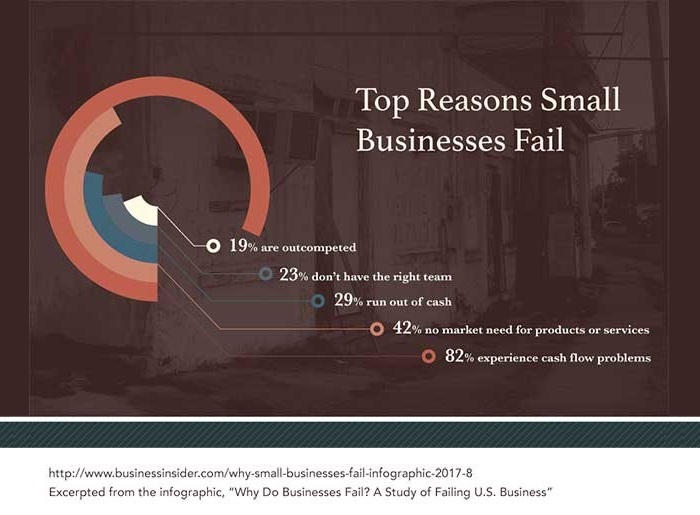Who wouldn’t want to quit their 9 to 5 job and set out on their own? Maybe you just watched the Steve Jobs documentary on Netflix, and you’re inspired to do just that. On the other hand, you may have already started your own business, and you want to ensure that it doesn’t become one of those alarming statistics.
While there’s nothing wrong with a little trial and error, the best entrepreneurs learn from the mistakes of others. If you want to be a success, there are certain things you should do and others you should avoid like the plague. Here are six mistakes you should avoid if you want to become a successful entrepreneur.
Mistakes to Avoid to Become a Successful Entrepreneur
1. Undercapitalizing Your Business

The number one reason small businesses fail it’s due to money matters. In fact, 82% of small businesses shut their doors because of cash flow problems. If you’re going to start and run a small business, you need to have sufficient funding resources.
This doesn’t mean that you need to have all of your capital lined up to open your doors, but you’ll need to have a plan to raise cash to remain in business. And some Industries are less capital-intensive than others. For example, starting an e-commerce website will require much less capital and infrastructure than, say, a manufacturing company.
2. Not Taking Risks
Entrepreneurs that always play it safe are rarely the ones you hear about making disruptive inroads in their Industries. If you want to achieve success, you’ll need to learn to get out of your comfort zone and start taking some chances.
Unfortunately, just because you take a few risks, that doesn’t mean that everything is going to work out perfectly. It still takes planning, intelligence, and courage to carefully evaluate your options and know when the time is right for your next move. And when something doesn’t go as planned, you’ll need perseverance to try again the next time.
3. Following the Crowd
If you’re approaching your product or service the same way that everyone else is, what is the point of your business? In other words, how are you going to differentiate yourself to attract new customers? It’s important to have a unique standpoint for your product and avoid following the crowd.
For example, most web host review sites test web hosting solutions as one-time experiences like HostingAdvice. Others, such as TrustPilot, rely heavily upon user reviews to measure the individual companies reviewed. HostScore, on the other hand, is completely unique. It provides an easy score reference to users based on server data consistency.
4. Not Having Goals
You won’t find many entrepreneurs who have achieved success that didn’t have a clear goal in mind from the start. Your goals give you purpose and help chart the direction of the tasks that you do each day to achieve them.
If you’re not sure how to set goals for your business, you can use the smart approach. SMART is an acronym for these five elements that your goals should include:
- Specific – Goals should be focused and well-defined.
- Measurable – Each goal should have a measurable outcome.
- Achievable – Goals should be realistic and attainable.
- Relevant – Goals should reflect the realities of the current industry and business climate.
- Timely – Goals should be time-based, meaning they have a deadline for achievement.
5. Being a Perfectionist
Perfectionism is another common pitfall of budding entrepreneurs. This is something you’ll want to examine closely if you’ve had your big eureka moment for a business yet have taken little action since.
Many business ideas never reach the shelves because their inventors are so busy perfecting every aspect of the launch that they waste all of their resources. The solution is to focus your resources on what is essential to launch your business. (Remember the Pareto Principle?) Then, you can work on making constant improvements that will maximize customer experience.
6. Going It Alone
If you think that you can find success as an entrepreneur completely on your own, you’re making a grave mistake. Not only are you going to need a team of diverse individuals in your corner, but also a strong external network.
As the owner of a start-up, you will want other intelligent professionals available that you can bounce some ideas off of, as well as a team to help you get things done. The entrepreneur who doesn’t believe that they need any help or advice is generally driven by ego and often destined for failure.
There are millions of advantages to the freedom of entrepreneurship, but this is a risk and reward endeavor. No one tells you how much money you can make, how to become productive or how hard you will have to work to make it. Hopefully, some of these tips can help you avoid several common pitfalls as well as increase your chances of success.


